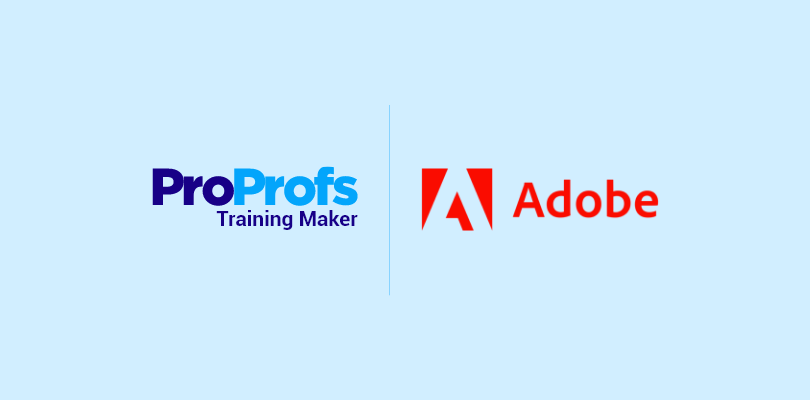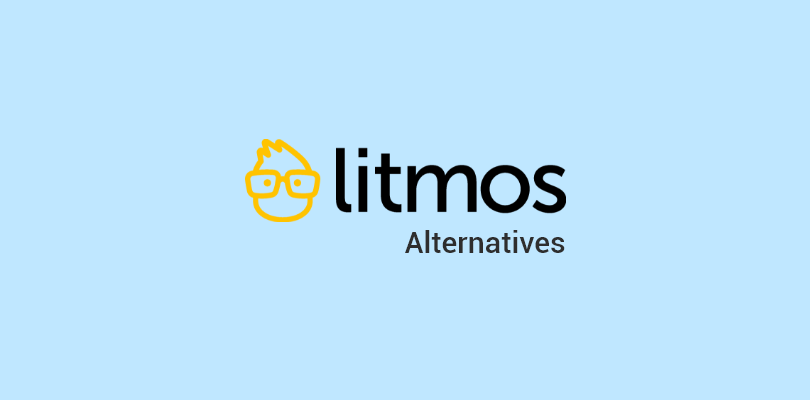Ever tried to brand an off-the-shelf learning platform only to realize it still screams someone else’s name? I once launched an online course, excited to build my brand until I logged in. My logo sat awkwardly next to the platform’s name, their colors clashed with my design, and every email to my learners came with their branding, not mine. It felt like I was promoting them, not me. That’s when I realized that owning your content isn’t enough. You need control over the entire experience.
A white label learning management system (LMS) fixes this. It’s the difference between renting space in someone else’s building and owning the whole structure—your brand, your rules.
Businesses, training providers, and entrepreneurs are all hunting for LMS solutions that look and feel like their own. But with so many options out there, which one delivers? Let’s break down the top 10 platforms, their features, pricing, and what makes them worth your investment.
| White-Label LMS | Best For | Pricing |
|---|---|---|
| ProProfs Training Maker | Employee training & LMS | Forever-free plan, Essentials plan starts at $1.99/learner/month |
| Paradiso | Out-of-the-box integrations | Professional & Enterprise plans, contact for pricing |
| Docebo | Complex enterprise training | Engage, Elevate, & Enterprise plans, contact for pricing |
| 360Learning | Collaborative learning | Team plan starts at $8 per user/month, Business plan - contact for pricing |
| Absorb LMS | Collaborative learning | Contact for pricing |
| LearnUpon | Corporate & eLearning | Essential, Premium, & Enterprise plans, contact for pricing |
| Litmos | Off-the-shelf training | Foundation, Premier, & Platinum Suites, with/without content |
| Seismic Learning (Formerly Lessonly) | Training sales teams | Pro Edition, Pro + Coaching Edition, Add-Ons - contact for pricing |
| iSpring Learn | eLearning & training | Training Management starts at $3.70 per user/month, Business plan at $4.10 per user/month |
| Edmingle | Scaling training business | Hybrid plan starts at $35/month, Pro at $55/month, Premium at $95/month |
What Is a White Label Learning Management System?
A white-label LMS is an LMS that supports customization, personalization, and rebranding to deliver training under your brand. It enables users to design the look and feel of online training programs with a custom appearance, including logos, themes, fonts, colors, designs, and messaging.
This customization feature helps you establish your brand identity, spread brand awareness, and create a stronger connection with your audience. You can feature your courses under your company name and remove all references to the LMS provider’s branding as if you built and owned the system.
What Are the Key Features of a White-Label LMS?
A white label LMS must have the following features as explained below:
Customizable Courses & Templates
A white-label LMS lets you design courses that look and feel like you. Choose from pre-built templates and courses or rstart from scratch—adjust colors, fonts, layouts, and more. Want a sleek corporate vibe? Done. Something more interactive and playful? No problem. The best part? No clunky, one-size-fits-all designs. Just a seamless learning experience that feels completely on-brand.
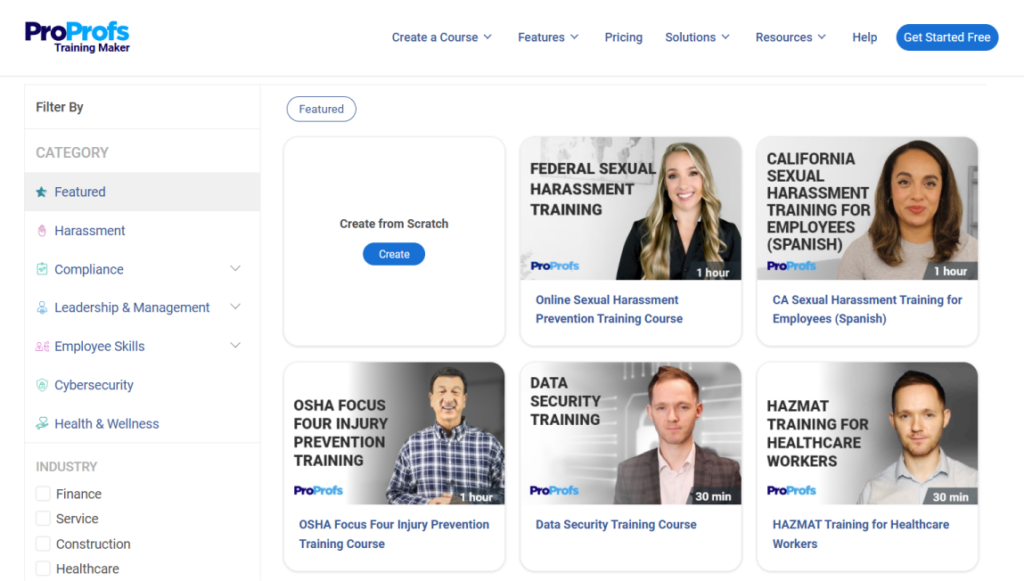
Brand Logo, Themes & Layout
With a white label learning management system, you can remove all traces of the software provider and replace them with your branding elements. Make custom training an integral part of your organization. Customize the look and feel of your learning platform by adding a logo, colors, fonts, themes, and styles to deliver a personalized learning experience. Your audience should easily identify your organization through consistency in branding and messaging across all your programs.
LMS Settings & Configurations
Settings such as the layout, course availability, password protection to courses, chapter skipping prevention, reordering course chapters, and number of attempts on courses come under it. Similarly, settings for video autoplay, notifications, integrations, and discussion & collaboration are available.
User Management
You can set up user roles and permissions or access levels for administrators, instructors, and learners. Likewise, you can easily import multiple users at once. The ability to organize learners into distinct groups based on departments, locations, or training types ensures easier user management.
Multilingual Support
Another characteristic of a white-label learning management system is the option to offer the LMS interface in multiple languages to cater to a diverse user base. Users can provide localized content by ensuring that all UI elements, buttons, menus, and notifications are available in a selected language.
Here’s a case study for you:
Branded Completion Certificates
This feature allows you to create custom certificates by uploading your own designs or by choosing customizable pre-built certificates. Generally, you should be able to add your brand name, logo, participant’s name, date, and signature to give a personal touch.
What Are the Benefits of White-Label LMS Platforms?
White-label LMS platforms provide organizations with a customizable and re-brandable online learning platform. Such a platform enables them to deliver tailored training content while showcasing their branding.
This eliminates the need to build an LMS from scratch, saving time and costs.
They offer user-friendly course creation, management, and reporting tools that bolster training efficiency.
With mobile compatibility and powerful integrations, these LMS enhance accessibility and scalability.
The LMS provider usually handles the technical aspects and updates, and this allows organizations to focus on content and user engagement.
Read this guide to know more.
How to Choose the Best White Label LMS
After working with countless LMS platforms, I’ve seen the difference between a truly white-label system and one that just slaps on a logo. Some platforms promise full customization but still sneak in their branding. Others give you total control, making it feel like you built the system yourself. So, how do you separate the best white label LMS from the rest?
- Branding Control – Can you remove all traces of the provider’s identity? Look for custom domains, white-labeled emails, and fully personalized dashboards. Your learners should never know a third-party platform exists.
- Ease of Use – A powerful LMS means nothing if it’s a nightmare to set up. Choose an intuitive system with drag-and-drop builders, easy course creation, and minimal learning curves.
- Scalability – Whether you’re training ten people or ten thousand, your LMS should grow with you. Flexible pricing, unlimited courses, and multi-tenant support are key.
- Features That Matter – Gamification, AI-driven analytics, mobile accessibility—your LMS should have the tools that fit your learning strategy.
- Support & Security – 24/7 support, data encryption, and compliance with GDPR or other regulations protect your data.
Choosing the right LMS isn’t just about features; it’s about control. The best white-label LMS platforms stay entirely invisible. They don’t leave any trace of their branding. Your learners see your logo, colors, and domain, making it feel like a system built entirely by you. That’s the kind of control you need to create a seamless and professional learning experience.
You can also watch this video to know more:
Get Free LMS Software — All Features, Forever.
We've helped 567 companies train 200,000+ employees. Create courses in under a minute with our AI LMS or use 200+ ready-made courses on compliance, harassment, DEI, onboarding, and more!
List of the Best White Label LMS
I curated this list based on my personal experiences, recommendations from friends and colleagues, reviews on software comparison sites, and customer testimonials.
1. ProProfs Training Maker
When I tried ProProfs Training Maker, I was delighted by its rich features, which make it an excellent white-label LMS platform. Features such as uploading your logo and choosing from themes and color schemes ensure consistent branding. The AI course creator, course library, and templates will help you create engaging courses in just a few minutes. The best part is that you can upload your existing documents, images, videos, podcasts, PDFs, and company policies to build custom courses.
The extensive customization toolkit, boasting 100+ settings and configurations, enabled me to fine-tune my training portal to align perfectly with organizational goals. Issuing branded completion certificates personalized with logos and participant details added a great touch, while automated reminders ensured compliance.
Features
- Personalize with logos, colors, and themes.
- Issue custom certificates with your logo.
- Pre-designed templates for quick course creation.
- Track learner progress and performance.
- Manage groups and course assignments securely.
Pros
- A library of hundreds of premium online courses for a quick start
- Supports self-paced learning by enabling learners to access courses and assessments on any device
- Multiple ways to share your courses (through email, website embed, SMS, QR code, etc.)
Cons
- Though there’s a cap on the number of learners, the software offers a free plan that provides access to all the features.
- The gamification and social learning features may not be relevant for solo users who don’t work with a team.
- There is no dedicated account manager for the free plan, unlike the paid
Best for
Employee training and LMS
Pricing
ProProfs offers simple and flexible pricing to meet your training needs. It has a forever-free plan. The Essentials plan starts at $1.99 per active learner per month with a cap of 100 learners. For larger teams, the Business plan is available at $3.99 per learner per month and supports up to 200 learners. For advanced features and customization, the Enterprise plan begins at $499 annually, offering unlimited learners and additional integrations. All plans include unlimited courses and features, with discounts available for annual billing.
Rating
2. Paradiso
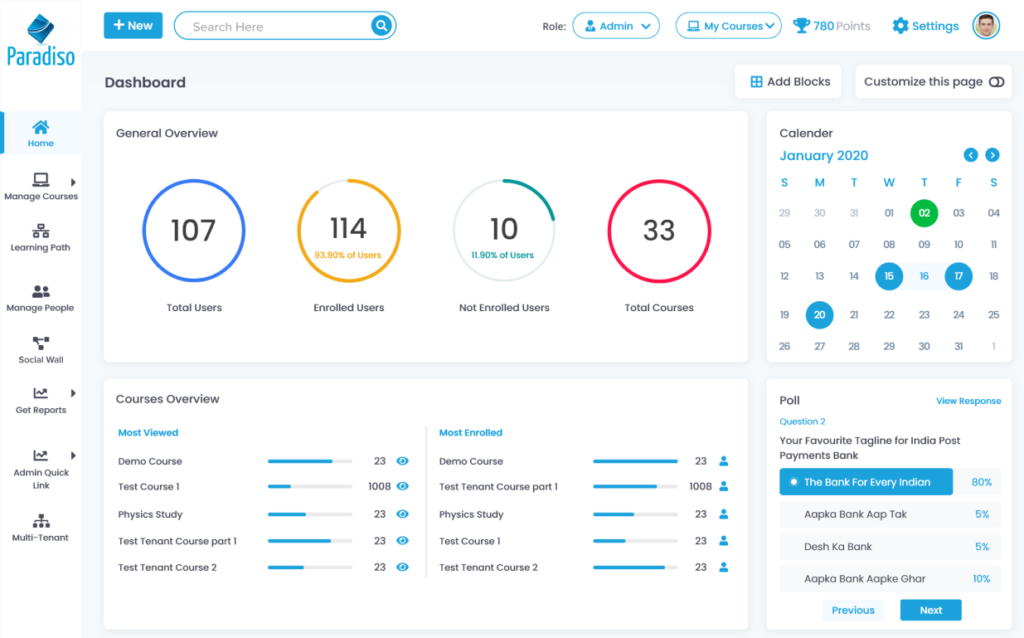
I recently came across Paradiso‘s LMS with white label features, and I have to say, it’s a great addition to the list of best LMS platforms, especially if you’re all about branding your online training platform. The customization options are fantastic. Everything from logo and color choices to layout adjustments can make your platform feel uniquely yours. Think about it: every detail, including notifications and emails, can carry your brand’s voice.
You can even use features like Single Sign-On, custom integrations, and gamification, which keep the learner experience smooth and fun. Paradiso LMS offers seamless integration with a wide range of third-party applications like CRM systems like Salesforce and Microsoft Dynamics, eCommerce platforms such as Shopify and WooCommerce, and video conferencing tools like Zoom and Microsoft Teams. It also engages training with options like virtual classrooms and social learning features. If you’re in the market for an LMS that puts YOU in the driver’s seat, you don’t want to miss out on this! Plus, there’s a free trial to try it before you buy it.
Features
- Customizable learning paths allow training to meet specific needs.
- AI-powered recommendations personalize learning for better engagement.
- Mobile learning enables access anytime, anywhere, on any device.
- Advanced reporting tools help track learner progress effectively.
Pros
- Flexible pricing plans cater to businesses of all sizes.
- Custom course development tailors training content to business needs.
- Top-tier data security safeguards sensitive information with robust encryption.
Cons
- The promised Shopify integration is non-functional, hindering users who rely on this feature.
- Paradiso LMS is based on an older version of Moodle that lacks GDPR compliance and support for certain modules
- It takes considerable time to learn how to use the platform effectively.
Best for
Out-of-the-box integrations
Pricing
Paradiso LMS offers flexible and customizable pricing plans designed to fit your business’s needs. Whether you’re a small business or a large enterprise, Paradiso provides affordable options that ensure scalability and support for both internal and external training requirements. The Professional Plan is perfect for small to medium organizations, while the Enterprise Plan caters to businesses with complex learning workflows.
Rating
3. Docebo
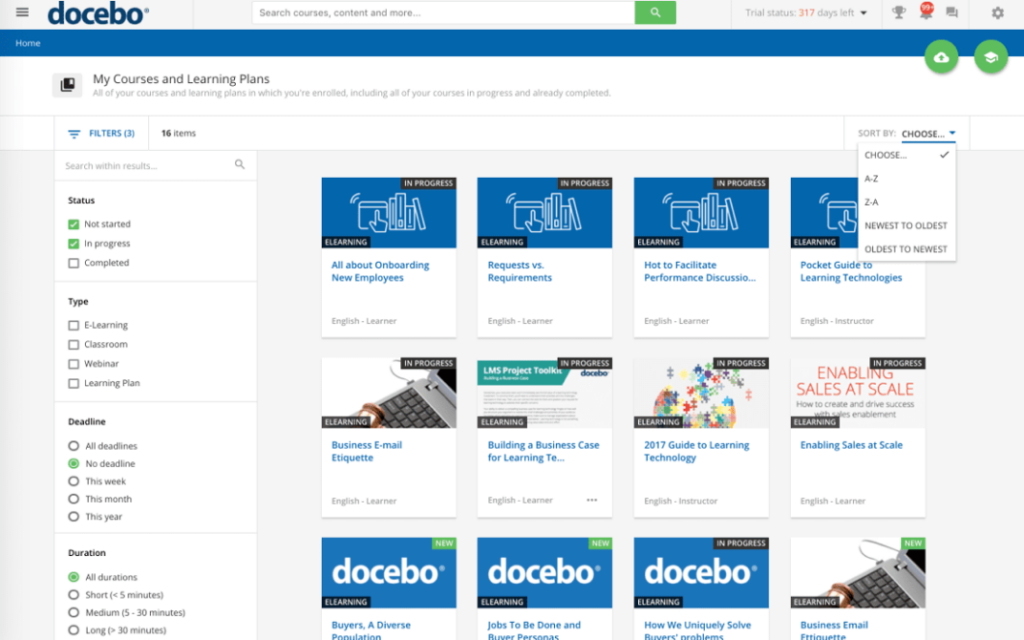
Want to unlock AI’s full potential in your training? Look no further than Docebo! With impressive White-Labeling features, it lets you fully customize logos, colors, and designs to match your brand’s vibe.
This white label LMS software focuses on delivering unique learning experiences for employees, partners, and customers, ensuring growth is always tailored to your needs. It’s packed with mobile learning, accessibility, and social integration to provide flexible, on-the-go training.
As an AI-powered LMS, Docebo’s configuration engine lets you easily create audience-specific pages with drag-and-drop. The platform’s adaptive learning paths and automated assessments ensure every learner’s journey is personalized. Plus, with predictive learning and natural language processing, your training becomes even smarter and more efficient.
Features
- Allows uploading and conversion of presentations, videos, and SCORM files
- ILT-Classroom app facilitates the development, scheduling, and management of instructor-led training sessions
- Flexible settings and a modern interface
- Integrates smoothly with third-party applications such as web conferencing, CMS, etc.
Pros
- Accelerates content creation, automates workflows, and enhances the learner experience using AI.
- Offers diverse programs like Employee Onboarding, Compliance Training, and more.
- Adapts to industries like tech, healthcare, and education for businesses of all sizes.
Cons
- No tools for gamification or AI-driven coaching to enhance engagement.
- Managers struggle to view their team’s upcoming training activities.
- The platform lacks adaptive learning features to personalize the learning journey.
Best for
Complex enterprise training
Pricing
Docebo offers scalable pricing that adapts to your organization’s growth. Whether you’re just starting with hundreds of learners or scaling to thousands, the platform provides tailored solutions like automated training, multilingual support, AI-powered content, and integration with up to eight tools. The platform has three main plans: Engage for early growth, Elevate for fast-scaling businesses, and Enterprise for large-scale global programs.
Rating
4. 360Learning
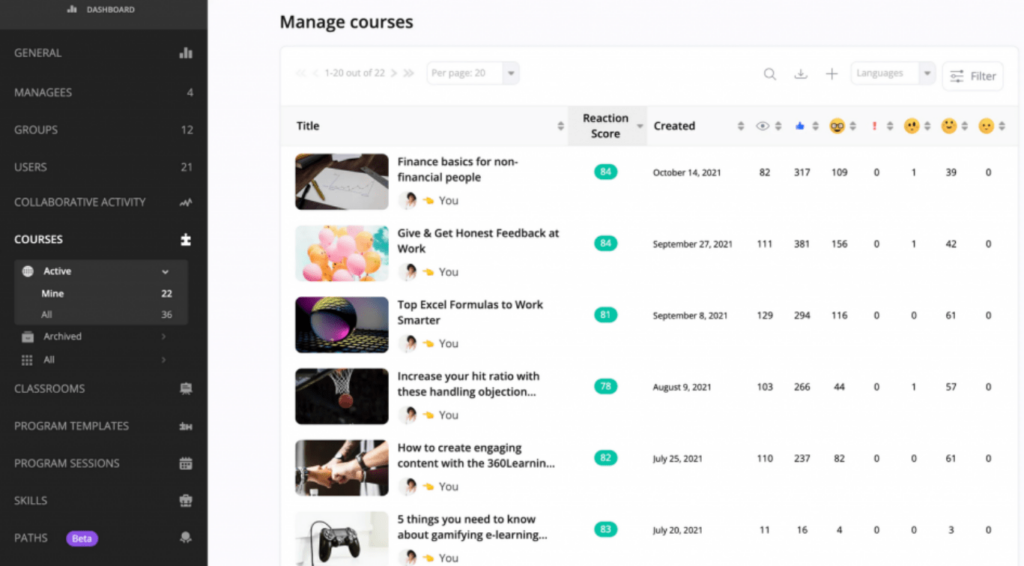
Let me introduce you to 360Learning—an LMS that’s all about collaboration and innovation. It blends AI and teamwork to transform internal experts into top-notch learning facilitators, shaking up the old-school eLearning model. With 360Learning, learning becomes engaging and self-directed.
The best part? You can fully personalize the platform’s URL and design which helps you create a unique learning experience that reflects your brand’s identity. Whether it’s customizing a subdomain or updating the full URL, 360Learning makes it easy to take your training game to the next level. Key benefits? Quick course creation, high completion rates (91%), and democratized content creation.
Features
- Provides access to a wide variety of courses and materials.
- Interactive elements such as discussions create stimulating learning opportunities.
- Supports various types of content, such as videos, quizzes, SCORM, webinars, etc.
Pros
- Transforms in-house experts into active L&D collaborators to foster fast and continuous upskilling.
- It eliminates the need for separate learning solutions and streamlines all training into one platform.
- The platform enhances learner engagement with interactive, peer-driven experiences, boosting completion rates.
Cons
- The search system should expand beyond just course titles.
- An improved method for grouping courses, such as a folder system, would make subject organization easier.
- Integrating a chatbot AI to search for courses could enhance the user experience.
Best for
Collaborative learning
Pricing
360Learning offers two pricing plans: the Team Plan, priced at $8 per registered user per month for up to 100 users, which includes no setup fees and provides access to collaborative learning tools, and the Business Plan, which includes more advanced features like integrations, solutions for every use case, and dedicated support. The Business Plan pricing is available upon request, and a demo is provided for interested users.
Rating
5. Absorb LMS
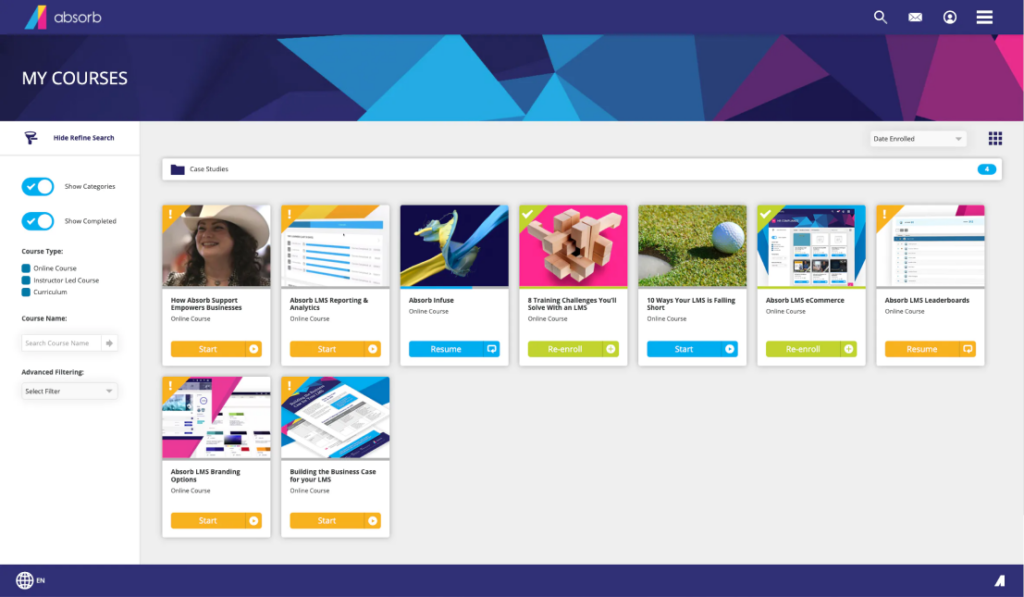
With Absorb LMS, you get full control over your training platform’s look and feel. The white labeling feature lets you customize everything, including the login screens, colors, logos, and domain, so your learners see your brand at every step. Keeping learners engaged is easier than ever.
Observation Checklists help them track progress, while e-signatures streamline course completions and acknowledgments, cutting down on admin work for you. And the best part? Absorb LMS tailors learning to each person. With AI-powered recommendations from Absorb Pinpoint, learners get content that matches their interests and progress. Plus, built-in discussion forums and shared achievements keep them engaged and connected.
Features
- Clean and easy-to-use interface that both learners and administrators can appreciate.
- The mobile app allows learners to access courses and tests on the go.
- Different kinds of reports to help track learner progress and identify areas for improvement.
Pros
- Regulatory compliance support across multiple global industries.
- Gamification features maximize learner engagement effectively.
- AI-generated courses are created quickly with minimal effort.
Cons
- Difficult to use for blended learning courses that combine online and in-person instruction.
- Some users have found the course management features in the tool to be lacking.
- The learning path feature is not as robust as some other LMS solutions.
Best for
Collaborative learning
Pricing
Absorb LMS offers flexible pricing based on factors like the number of learners, training type (internal or external), and additional features such as course authoring. Pricing is customized to fit specific business needs—contact Absorb for a personalized quote.
Rating
6. LearnUpon
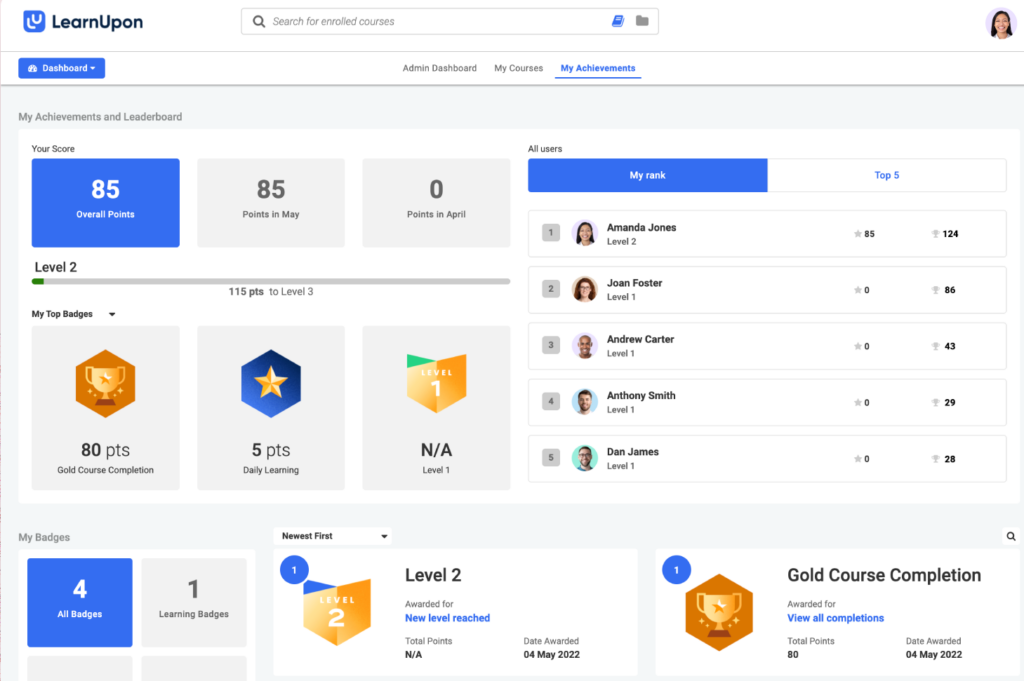
I really love LearnUpon, not just for its fantastic webinar functionalities but also for its white-labeling options. As the best white label LMS software, you can easily customize the platform with a custom URL. It helps maintain a seamless user brand experience to create a unified learning environment under your branding. I was impressed by how easy it is to manage and organize training content.
LearnUpon supports different types of users and learning scenarios. The transparent pricing and powerful support resources add significant value, which makes it an ideal choice for businesses looking for an all-in-one solution. This tool truly offers great versatility and flexibility to meet the needs of modern learning.
Features
- Has a clean, beautiful, and easy-to-use user interface that makes it easy to navigate.
- Offers a robust eCommerce feature that allows users to sell their courses online.
- Supports all content types, including documents, video, audio, text, and images and SCORM-based courses.
- Integrates with Zoom, Salesforce, Mailchimp, and Google Analytics.
Pros
- SCORM and xAPI keep courses easy to use.
- Custom branding helps create a unique experience.
- Two-way API connects with other tools easily.
Cons
- Without a payment gateway integration, students can’t see which courses they bought or at what price.
- User registration lacks the required name details.
- The system places too many limits on how discounts work, making it frustrating to apply promotions.
Best for
Corporate & eLearning
Pricing
LearnUpon offers three pricing plans based on user count and features. The Essential plan supports up to 150 users, the Premium plan covers 150 to 500 users with deeper integrations, and the Enterprise plan is designed for 500+ users with advanced customization and strategic support. Pricing details are not listed, so you must contact sales for exact costs.
Rating
7. Litmos
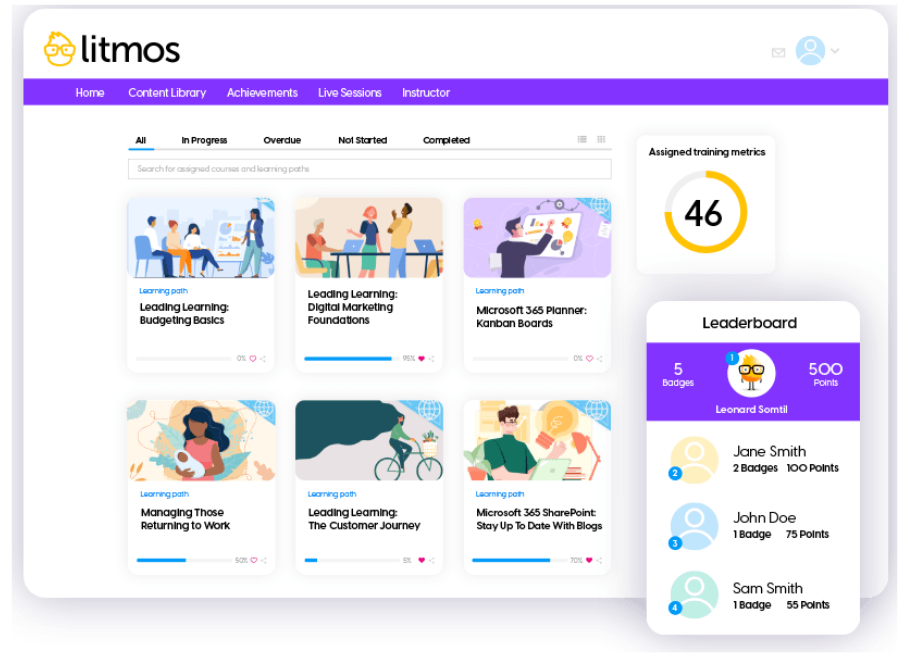
When it comes to gamified learning, Litmos is among the top platforms designed for intelligent enterprises. About 20+ million learners across 150 nations use this tool. With Litmos, companies can deploy cloud-based, secure training programs encompassing virtual, classroom, mobile, and social learning. Gamification features like leaderboards, badges, and achievements increase learner engagement and motivation. This gamified approach fosters friendly competition and encourages course completion, enhancing the learning experience.
Moreover, the white-labeling capabilities of Litmos allow companies to customize the LMS to align with their branding, ensuring a seamless and immersive learning environment. The platform supports deep learner engagement through video assessments and real-time notifications.
Features
- Provides multilingual support to cater to a broader audience (As of now, it supports 35 languages)
- Supports both web-based and instructor-led training
- Build dynamic SCORM content to support everyone, be it a novice trainer or an instructional designer
- Out-of-the-box eCommerce abilities to sell your courses or set up your storefront through Shopify integration
Pros
- Points, badges, and leaderboards make training feel like a game, boosting engagement.
- No need to sit at a desk. Learn on the go, anytime, from any device.
- Track progress, measure impact, and tweak training strategies with real-time analytics.
Cons
- Reporting views on-screen shows misinformation. Reporting on learning paths is especially challenging
- The text editor is limited and does not allow much formatting or customization of the course content
- The user roles and permissions are limited in terms of access and visibility of different users or groups
Best for
Off-the-shelf training
Pricing
Litmos keeps it simple with three plans: Foundation Suite for small teams, Premier Suite for growing businesses, and Platinum Suite for big players who want all the bells and whistles. You can grab them with or without content, and if you need extras like consulting, integrations, or additional tenants, they’ve got that too!
Rating
8. Seismic Learning (Formerly Lessonly)
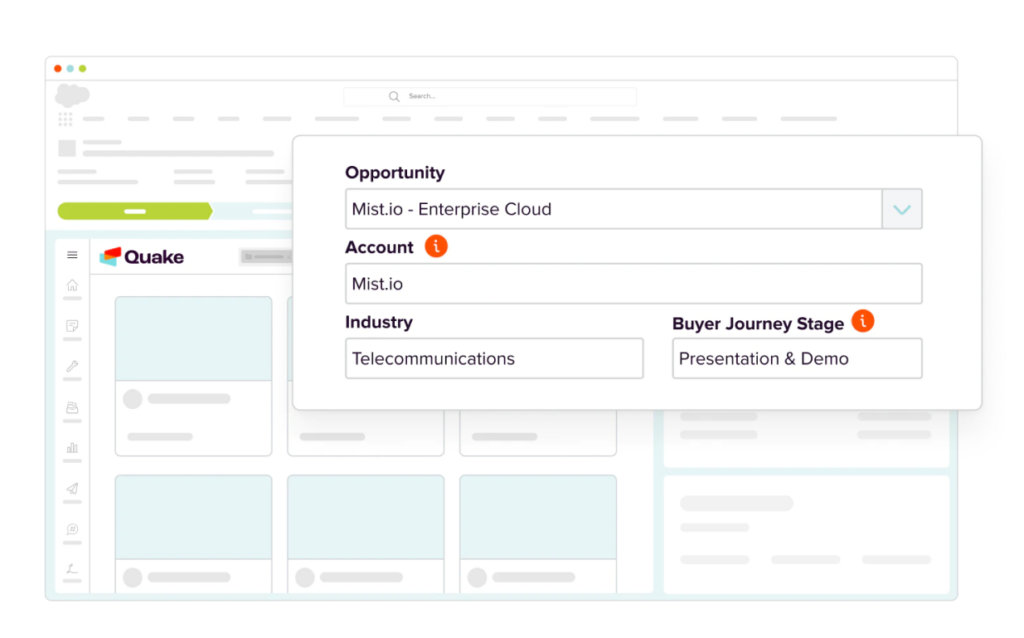
Another tool I’d add to the list of top white-label platforms is Seismic Learning. Unlike most LMS options, Seismic goes beyond training—it’s a complete sales enablement powerhouse. Think of it as a central hub where your team gets the right content, insights, and coaching—all under your brand. Its white-labeling lets businesses fully customize the platform, from branding to tailored workflows, ensuring a seamless user experience.
For sales teams, Seismic means less time searching for content and more time closing deals. It offers AI-driven insights, digital sales rooms, and automated content distribution, turning training into real revenue. Whether scaling a team or optimizing sales strategies, Seismic delivers everything needed to win.
Features
- Helps the teams ramp faster, deliver effective feedback, and continuously improve.
- It supports customizable learning paths and corporate onboarding processes.
- It offers high-quality pre-made courses or assets that are specific to certain industries.
- It has an incredibly intuitive interface, and building lessons is a breeze.
Pros
- Works with 150+ tools like CRM, email, and collaboration software to streamline workflows.
- Tracks content engagement, showing what prospects view so teams can follow up strategically.
- Intuitive for small teams yet powerful enough for large enterprises.
Cons
- Lacks built-in reminder features to keep learners on track.
- More interactive assessments would improve comprehension.
- Limited options for modifying text, themes, and lesson templates.
Best for
Training sales team
Pricing
Seismic Learning’s official website does not list pricing details. I have collected the information from G2—Pro Edition, Pro + Coaching Edition, Add-Ons, and Enterprise all require contacting Seismic for pricing. The Pro Edition offers unlimited lessons and a personal client experience manager, while Pro + Coaching includes advanced coaching features. Enterprise plans are fully customized.
Rating
9. iSpring Learn
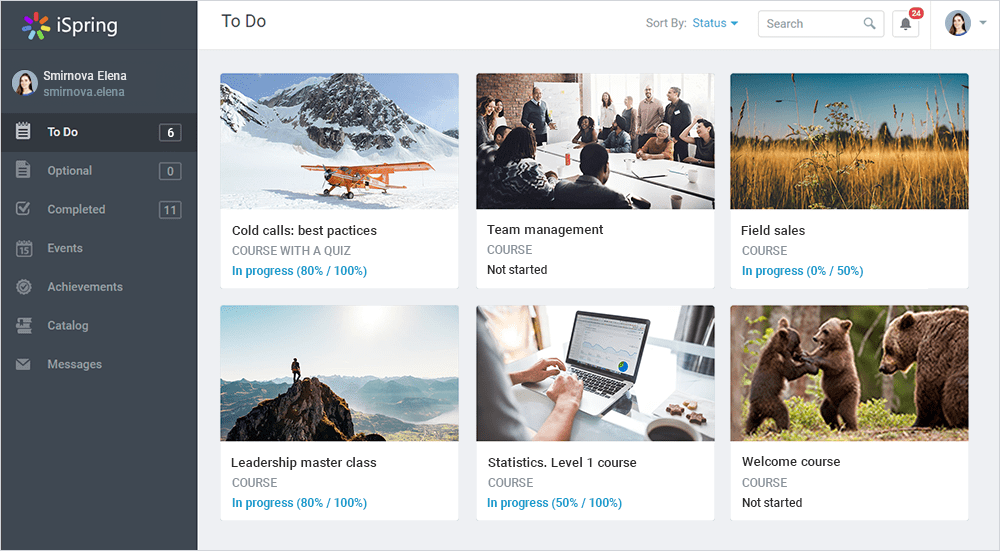
iSpring Learn is a white-label LMS that transforms corporate training into a fully branded experience. Instead of a generic platform, you get a white label LMS that looks like an extension of your brand—logo, colors, domain, and even a custom mobile app. Employees download the training app from Google Play and the Apple Store under your brand name.
Pair it with iSpring Suite to create custom courses, branded templates, and interactive learning paths. There is no need to build a system from scratch; iSpring Learn handles onboarding, compliance training, microlearning, and more while ensuring GDPR and HIPAA compliance for data security. Training becomes effortless with a simple setup, award-winning support, and seamless mobile access. Whether a startup or an enterprise, iSpring Learn scales with your needs.
Features
- On-premise installation that enables organizations to deploy the platform within their infrastructure
- A flexible reporting system allows organizations to request tailored reports
- Provides enhanced data control and security, especially for those with specific compliance or security requirements
- Capability to localize the user portal into multiple languages to engage with non-English-speaking audiences
Pros
- iSpring Learn ensures GDPR and HIPAA compliance, secure servers, and advanced access controls.
- It supports onboarding, compliance training, microlearning, product training, and partner training.
- The platform provides insights into learner progress, completion rates, and engagement.
Cons
- Managers cannot access Performance Appraisals they’ve completed until the company finalizes the review cycle.
- Limited quiz options and lack features like copy-paste restrictions to prevent cheating.
- There are no built-in AI tools for content creation assistance.
Best for
eLearning & training
Pricing
iSpring Learn offers affordable pricing with no hidden fees for storage or bandwidth. The Training Management plan starts at $3.70 per user/month for 300 users. In contrast, the Business plan costs $4.10 per user/month with additional features like unlimited storage, custom roles, and a corporate portal. Custom pricing and on-premise solutions are available for enterprises.
Rating
10. Edmingle
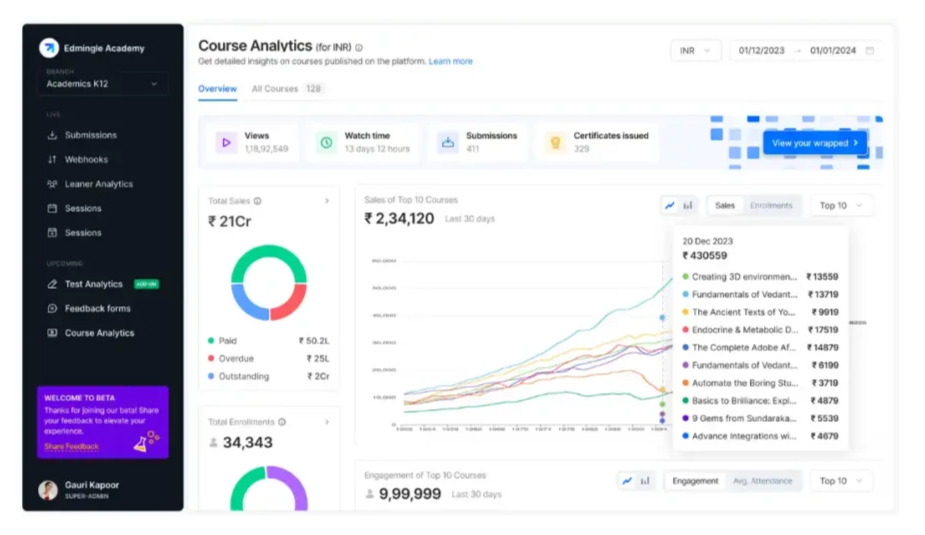
The last tool I’d add to the list of the best white-labeling platforms is Edmingle, which lets you build a complete learning ecosystem with full white-labeling capabilities. Your brand remains front and center, with a custom domain, logo, and mobile app under your name. No coding is required—just a few clicks and your learning platform looks precisely how you envision it. Integrated payment gateways ensure a seamless checkout experience, while in-built marketing tools help expand your reach.
Edmingle also simplifies live learning. Schedule and conduct live classes with automatic recording so learners never miss a session. Multiple file format support allows diverse content delivery.
Features
- Provides full branding control with a custom domain and design.
- Stores and manages recorded live sessions for on-demand access.
- Allows scheduling of course content for gradual release.
- Supports multiple course batches with different timing options.
Pros
- Provides full branding control with a custom domain and design.
- Stores and manages recorded live sessions for on-demand access.
- Restricts access to exclusive courses with private enrollment.
Cons
- Notifications do not always work properly, causing missed updates.
- Disabling developer options during setup feels confusing for users.
- Attendance and report generation need better accuracy and efficiency.
Best for
Scaling training business
Pricing
Edmingle offers flexible pricing to fit different business needs. The Hybrid plan starts at $35/month with 2.9% revenue sharing, which is ideal for small-scale educators. The Pro plan, priced at $55/month, removes revenue sharing and adds advanced features like certificate generation and payment gateway integration. The Premium plan costs $95/month and offers full white-label support, iOS app access, and expanded admin control. The Enterprise plan provides custom pricing for large organizations with dedicated account management.
Rating
Take Your Branding to the Next Level With White-Label LMS
As you explore the options, consider your unique needs and priorities. Do you value ease of use, advanced customization, AI-powered features, or specific integrations? Each platform has its strengths, so take advantage of free trials and demos to experience them firsthand.
Don’t be afraid to think beyond the technology itself. How will you leverage the white-label LMS to create engaging content, foster a thriving community, and achieve your learning goals? The possibilities are endless, and the right platform will be your partner in bringing that vision to life.
This is your opportunity to take control of your training destiny. Choose wisely, build boldly, and create learning experiences that leave a lasting impact.
Frequently Asked Questions
Is a white-label LMS different from a regular LMS?
Yes, a white-label LMS is a customizable platform that allows organizations to brand the system as their own. In contrast, a regular LMS typically comes with predefined branding and limited customization options. A white-label LMS offers greater flexibility regarding appearance, features, and user experience.
What are the main differences between a custom LMS and a white-label LMS?
The main differences between a custom LMS and a white-label LMS are:
- Customization Level: A custom LMS is built from scratch to meet specific requirements, offering complete control over features, design, and functionality. A white-label LMS, on the other hand, provides a pre-built platform that can be rebranded and customized to a certain extent.
- Development Time and Cost: Developing a custom LMS is typically more time-consuming and expensive than implementing a White-Label LMS.
- Flexibility: A custom LMS offers maximum flexibility to meet unique needs, while a White-Label LMS offers moderate flexibility within the constraints of the existing platform.
Are there any free white-label LMS options available?
Yes, there are. These platforms offer the product free of charge for limited usage. This enables users to try the product before committing to a paid plan. Additional premium features are available for a fee. Examples include ProProfs Training Maker, Moodle, and Open edX.
Are white-label LMS secure?
White-Label LMS platforms are generally designed with security in mind. They offer various security features, such as data encryption, user authentication, and regular security updates. However, the security of a white-label LMS also depends on how it is configured and maintained. It’s important to choose a reputable provider and follow best practices for security management.
Do I need any technical expertise to use a white-label LMS?
The level of technical expertise required to use a white-label LMS varies depending on the platform. Some white-label LMS are user-friendly and designed for easy setup and management without extensive tech knowledge. Others may require more expertise for customization and maintenance. Many providers offer support and documentation to help users navigate the platform.
How does a white-label LMS platform work?
A white-label LMS platform allows businesses to customize the learning environment with their branding, logos, and domain. It provides a seamless learning experience by integrating existing tools, offering personalized content, and automating training processes while maintaining the company’s identity.
How much does a White Label LMS cost?
The cost of a white-label LMS varies based on features, user capacity, and customization needs. Pricing models range from monthly subscriptions to one-time licensing fees, typically starting at one dollar/learner/month for basic plans and increasing for advanced options.
Which white-label LMS platform is the best?
The best LMS depends on business needs, but platforms like ProProfs Training Maker, Paradiso LMS, and LearnUpon offer top-tier customization, integration options, and scalability. Factors such as ease of use, support, and security are key in determining the best fit.
How to implement a white-label LMS
Implementing a white label LMS involves choosing the right platform, customizing branding elements, integrating existing tools, uploading content, and configuring user roles. Proper onboarding, training, and continuous monitoring ensure a smooth transition and effective learning management.
 Tips
Tips
We’d love to hear your tips & suggestions on this article!
Get Free LMS Software — All Features, Forever.
We've helped 567 companies train 200,000+ employees. Create courses in under a minute with our AI LMS or use 200+ ready-made courses on compliance, harassment, DEI, onboarding, and more!

 We'd love your feedback!
We'd love your feedback! Thanks for your feedback!
Thanks for your feedback!


